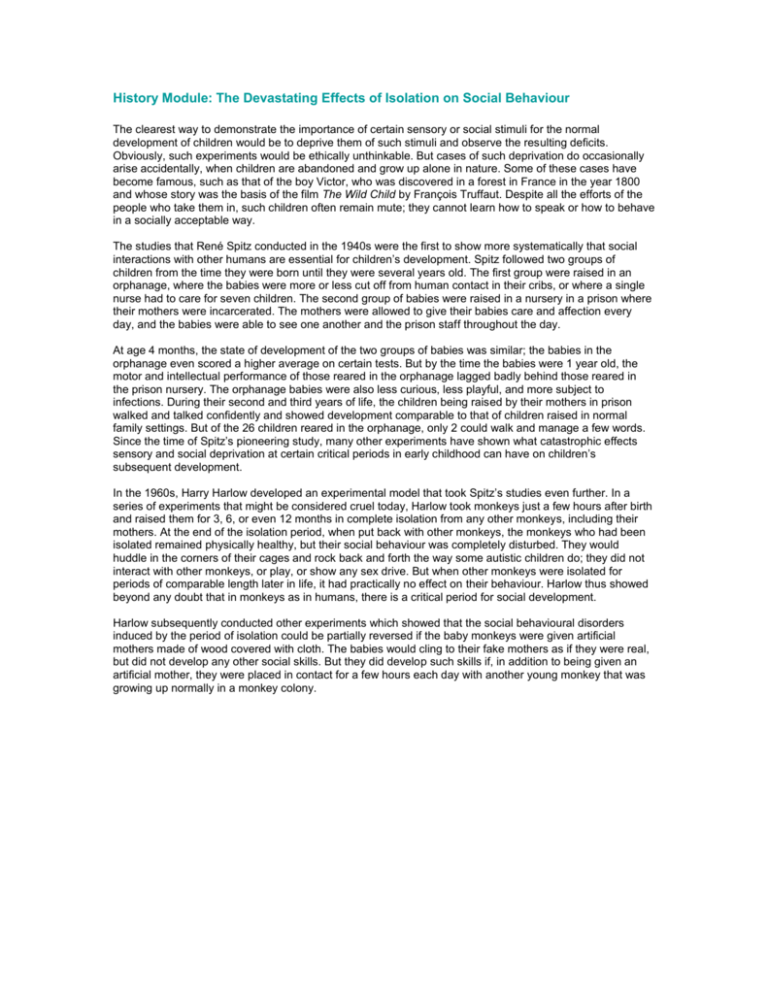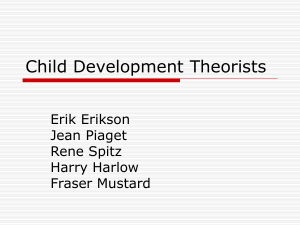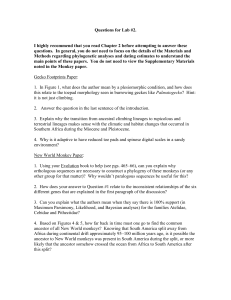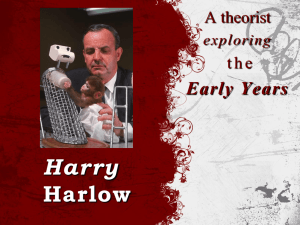History Module: The Devastating Effects of Isolation on Social
advertisement

History Module: The Devastating Effects of Isolation on Social Behaviour The clearest way to demonstrate the importance of certain sensory or social stimuli for the normal development of children would be to deprive them of such stimuli and observe the resulting deficits. Obviously, such experiments would be ethically unthinkable. But cases of such deprivation do occasionally arise accidentally, when children are abandoned and grow up alone in nature. Some of these cases have become famous, such as that of the boy Victor, who was discovered in a forest in France in the year 1800 and whose story was the basis of the film The Wild Child by François Truffaut. Despite all the efforts of the people who take them in, such children often remain mute; they cannot learn how to speak or how to behave in a socially acceptable way. The studies that René Spitz conducted in the 1940s were the first to show more systematically that social interactions with other humans are essential for children’s development. Spitz followed two groups of children from the time they were born until they were several years old. The first group were raised in an orphanage, where the babies were more or less cut off from human contact in their cribs, or where a single nurse had to care for seven children. The second group of babies were raised in a nursery in a prison where their mothers were incarcerated. The mothers were allowed to give their babies care and affection every day, and the babies were able to see one another and the prison staff throughout the day. At age 4 months, the state of development of the two groups of babies was similar; the babies in the orphanage even scored a higher average on certain tests. But by the time the babies were 1 year old, the motor and intellectual performance of those reared in the orphanage lagged badly behind those reared in the prison nursery. The orphanage babies were also less curious, less playful, and more subject to infections. During their second and third years of life, the children being raised by their mothers in prison walked and talked confidently and showed development comparable to that of children raised in normal family settings. But of the 26 children reared in the orphanage, only 2 could walk and manage a few words. Since the time of Spitz’s pioneering study, many other experiments have shown what catastrophic effects sensory and social deprivation at certain critical periods in early childhood can have on children’s subsequent development. In the 1960s, Harry Harlow developed an experimental model that took Spitz’s studies even further. In a series of experiments that might be considered cruel today, Harlow took monkeys just a few hours after birth and raised them for 3, 6, or even 12 months in complete isolation from any other monkeys, including their mothers. At the end of the isolation period, when put back with other monkeys, the monkeys who had been isolated remained physically healthy, but their social behaviour was completely disturbed. They would huddle in the corners of their cages and rock back and forth the way some autistic children do; they did not interact with other monkeys, or play, or show any sex drive. But when other monkeys were isolated for periods of comparable length later in life, it had practically no effect on their behaviour. Harlow thus showed beyond any doubt that in monkeys as in humans, there is a critical period for social development. Harlow subsequently conducted other experiments which showed that the social behavioural disorders induced by the period of isolation could be partially reversed if the baby monkeys were given artificial mothers made of wood covered with cloth. The babies would cling to their fake mothers as if they were real, but did not develop any other social skills. But they did develop such skills if, in addition to being given an artificial mother, they were placed in contact for a few hours each day with another young monkey that was growing up normally in a monkey colony.






